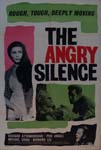
THE ANGRY SILENCE
UK, 1960, 91 minutes, Black and white.
Richard Attenborough, Pier Angeli, Michael Craig, Bernard Lee, Geoffrey Keen.
Directed by Guy Green.
The Angry Silence takes up the question of the unions and the individual and their inevitable clash, where the solidarity of union men to improve their conditions is manipulated by unscrupulous stirrers; solidarity, then, tramples on the individual with his right to work and on the family he must support.
Tom Curtis and his family live in an ugly British industrial city. A friend, Joe, boards with them. During factory troubles and strikes, Tom takes a stand against union domination and he and his family suffer the consequences, both physically and morally, Bryan Forbes and Richard Attenborough have made a number of films of social awareness. This was one of their earliest projects. Guy Green (who later directed A Patch of Blue, The Magus and A Walk in the Spring Rain) directed this film. It could be seen in conjunction with its contemporary, Saturday Night and Sunday Morning, which is less positive in tone and outlook. The Angry Silence is a fine British film.
1. The Angry Silence concerns a man's right to work. What are the issues the film raises concerning:
- the individual worker and his place in a factory?
- the family 's right to livelihood?
- Strikes, official or unofficial?
- the role of the factory bosses?
- the responsibility of the board of managers?
- the stirrers who want confirmed industrial trouble?
2. Do you agree with Tom Curtis' attitudes? Beliefs? Behaviour?
3. Joe as a character?
- in boycotting Tom?
- in standing up for him at the end?
- his attitudes: living with the Curtis family; "Don't stick your neck out"; "they are all twits"? Was the resolution convincing?
4. What impact did the following scenes have on the significance of work and Tom Curtis' behaviour:
- the family scenes at home with children and Mrs Curtis' pregnancy; the window smashing; the garbage?
- When Brian was in the toilet?
- Tom's accident?
5. Impressions of individual rights and the unions; union business and pride of union solidarity; 'Brothers', 'Democratic' committees and majorities, "Go along with the majority; that's the democratic way".
6. Curtis ' attitudes; "We 're all so equal, we 're nothing. " "Are people allowed to be different?" Was he obstinate, selfish, or brave, honest, thinking?
7. How serious was the strike? What could people do, could do, in such a situation? Go to work with the majority? Stand alone? Boycott? Persecute? What was the purpose of the strike?
8. The impact of the interview with 'Gladys' and Eddie? They voted because "all put their hands up" and "Tom had it coming to him".